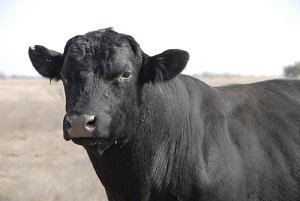Guest Writer for Wake Up World
Some may say there’s something romantic about beef. “Black angus cattle” conjures up thoughts of tough cattle grazing on the open pastures in the rugged farmland of America’s heartland. I personally follow an organic vegan diet, but I realize many people enjoy a thick, hearty steak and consider it a taste of the literal fat of the land. The commercials depict jeans, boots, trucks, hard work, good intentions- it seems so pure.
Unfortunately, that imagery is mostly limited to the advertisements. Some argue that the industry’s decisions are made mostly by bean counters and pharmaceutical drug developers who are removed from the farm and don’t have to worry about getting their shoes dirty.
Don’t get me wrong, there are many good and very decent people who work in the beef industry. But, the beef industry is like any other and making money is mandatory. Costs must go down, performance must go up.
Enter Zilmax, the industry’s performance enhancing drug.
[pro_ad_display_adzone id=”110028″]
What is Zilmax?
Zilmax is a feed supplement that contains Zilpaterol hydrochloride (ZH), a drug that makes cattle produce more muscle and less fat. Formally, the Federal Drug Administration recognizes that Zilpaterol hydrochloride “increases rate of body weight gain, improves feed efficiency, and increases carcass leanness.” [1] Zilmax is added to cattle feed, usually during the last few weeks before slaughter, as a final fattening up process. Except the cattle don’t get fatter, they get more muscular.
Why is Zilmax Used?
Growth drugs are being promoted as measures to save on costs while increasing production. They allow cattle to produce more meat without any extra food or water. On paper, that’s very attractive. Additionally, external factors like the weather can put farming operations on high alert. A drought will cause feed and water prices to go up. Cattle farmers have hundreds or thousands of mouths to feed, literally. If there’s a way to do it cheaper, it’s going to be considered.
What’s the Downside?
Zilmax, and other products with ZH, may produce more steak, but do they produce a better steak? A casual analysis produces doubts. Zilmax makes cattle produce more muscle and less fat, this isn’t all positive. Ask anyone who eats steak, the marbling (fat) is a desired quality that provides the juicy flavor and tender texture. Without it, you may as well be eating shoe leather. Many people say that is what ZH steaks taste like, too.
Trained taste testers at the Department of Animal Science at Oklahoma State University reported that ZH steaks were less juicy and more tough than steaks without. [2] Researchers at the Department of Animal Sciences at the University of Illinois at Urbana-Champaign also described ZH steaks as less tender but suggested that aging the steaks may help that out. [3] Oh, okay then.
Predictably, manufacturers of ZH products claim the drug doesn’t affect meat quality. [4]
Who is Affected?
The industry has implemented widespread use of Zilmax and four companies (National Beef Packing, Tyson Foods, Cargill, and JBS SA) control about 85% of the meat packing industry. If you eat beef, this affects you. Does this make you more interested in organic, free-range, hormone-free meat? Or, even avoiding meat altogether and adopting a vegan diet?
-Dr. Edward F. Group III, DC, ND, DACBN, DABFM
References:
- Delmore RJ, Hodgen JM, Johnson BJ. Perspectives on the application of zilpaterol hydrochloride in the United States beef industry. http://www.ncbi.nlm.nih.gov/pubmed/20382871
- Garmyn AJ, Shook JN, VanOverbeke DL, Beckett JL, Delmore RJ, Yates DA, Allen DM, Hilton GG. The effects of zilpaterol hydrochloride on carcass cutability and tenderness of calf-fed Holstein steers. http://www.ncbi.nlm.nih.gov/pubmed/20382878
- Holmer SF, Fernà¡ndez-Dueà±as DM, Scramlin SM, Souza CM, Boler DD, McKeith FK, Killefer J, Delmore RJ, Beckett JL, Lawrence TE, VanOverbeke DL, Hilton GG, Dikeman ME, Brooks JC, Zinn RA, Streeter MN, Hutcheson JP, Nichols WT, Allen DM, Yates DA. The effect of zilpaterol hydrochloride on meat quality of calf-fed Holstein steers. http://www.ncbi.nlm.nih.gov/pubmed/19648490
- Merck Animal Health. Zilmax. https://web.archive.org/web/20200421000321/https://www.merck-animal-health-usa.com/products/zilmax/overview.aspx
Previous articles by Dr Edward
- The Health Benefits of Cloves
- Tribulus Terrestris: Herbal Aphrodisiac?
- Top 10 ProBiotic Foods to Add to Your Diet
- 10 Foods That Detox the Body
- The Benefits of Organic Hemp Milk + How to Make Your Own
- 15 Foods High in Vitamin E
- Lung Cleansing With Peppermint Oil
- How to Flush the Liver
- Natural Remedies For Bad Breath
About the Author
Dr. Edward F. Group founded Global Healing Center in 1998 and is currently the Chief Executive Officer. Heading up the research and development team, Dr. Group assumes a hands-on approach in producing new and advanced degenerative disease products and information.
Dr. Group has studied natural healing methods for over 20 years and now teaches individuals and practitioners all around the world. He no longer sees patients but solely concentrates on spreading the word of health and wellness to the global community. Under his leadership, Global Healing Center, Inc. has earned recognition as one of the largest alternative, natural and organic health resources on the Internet.
[pro_ad_display_adzone id=”110027″]







